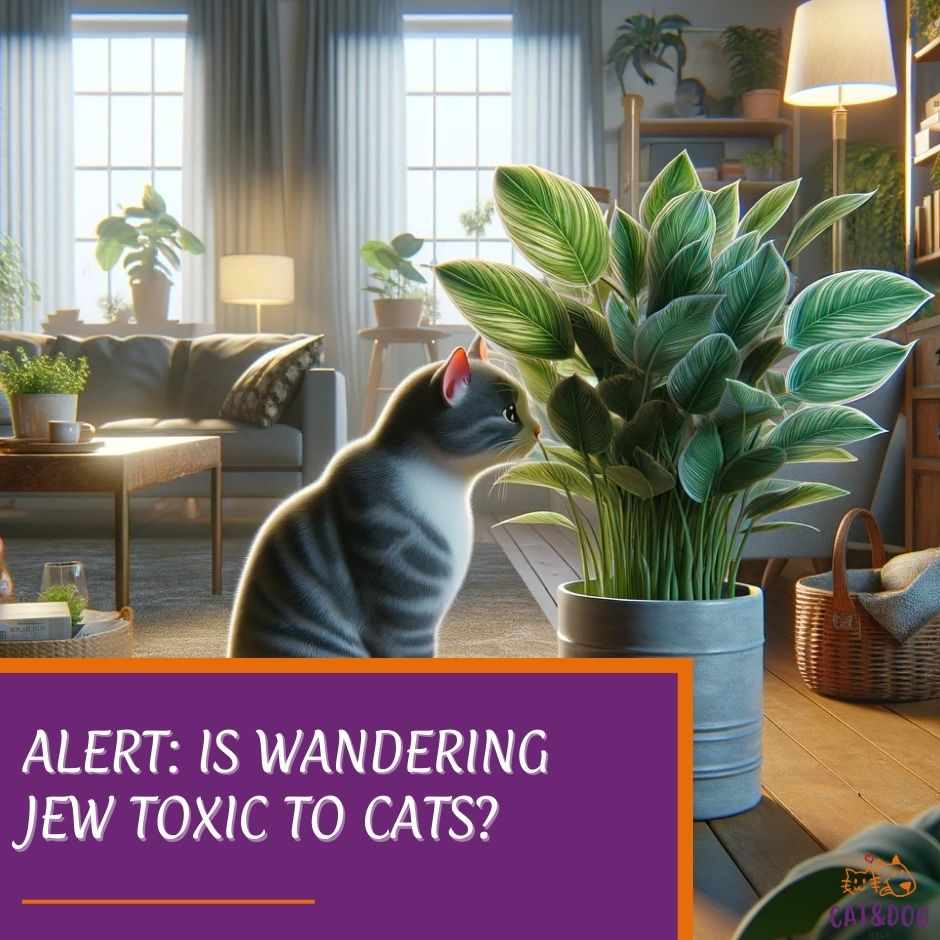Is Wandering Jew toxic to cats?
Considering the popularity of the Wandering Jew plant (Tradescantia genus) among households for its vibrant leaves and hardiness, it’s a question worth pondering.
The plant contains sap that can be irksome to your cat’s digestive system, potentially causing discomfort and health issues. (1)
Although typically not fatal, it’s crucial to be aware that the sap can cause discomfort, including skin irritation and gastrointestinal upset such as vomiting or diarrhea, which can impact your cat’s health. (2)
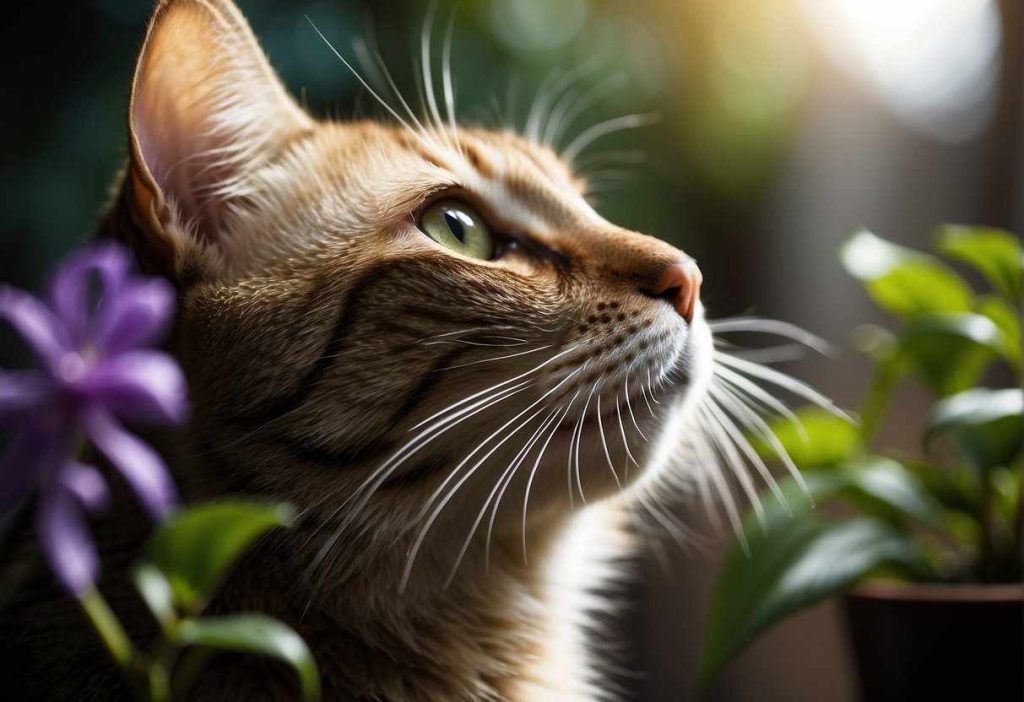
You might ever worried about whether your beloved feline friend can safely roam around your indoor garden.
It’s essential to know that while the Wandering Jew plant adds a touch of lush greenery to your home, it comes with a caveat for cat owners.
As a responsible pet owner, it’s important to strike a balance between nurturing your green space and ensuring the safety of your pets.
While the Wandering Jew plant isn’t categorized as highly toxic, its mild toxicity warrants caution.
To maintain a harmonious living space for both plants and pets, understanding how to prevent mishaps and recognizing the signs of possible discomfort in your cat will go a long way in taking necessary precautions.
Key Takeaways
- Wandering Jew plants have sap that can irritate cats’ skin and digestive system.
- Mild toxicity of the plant calls for prudent preventive measures in homes with cats.
- Recognizing discomfort signs in cats is crucial for a swift response to potential sap ingestion.
Is Wandering Jew Toxic to Cats: Detailed Analysis
Why Wandering Jew is Harmful to Cats?
Ever wondered why the Wandering Jew plant isn’t a good mix with your feline friends? Well, it boils down to the sap inside its stems.
While the leaves might not trigger a toxic reaction immediately, the sap can be troublesome for your cat’s digestive system, potentially leading to convulsions and other serious health issues.
It’s a bit like a bad food combo, not something your kitty would thank you for!
In-depth Explanation of Toxic Elements
- Compounds: Specific to the plant, yet not thoroughly named in common resources, these compounds when ingested, can prompt a reaction.
- Symptoms: These reactions manifest as dermatitis, itching, and sometimes more severe gastrointestinal upset. Think of it like a cat’s own version of a bad rash with a side of feeling queasy. (3)
Effects on Cats
- Skin Contact
- Redness
- Itching
- Swelling (in severe cases)
- Ingestion
- Gastrointestinal irritation
- Vomiting
- Diarrhea
Remember, your furball has sensitive skin and a delicate stomach. So, what might seem like a harmless nibble can turn into an unpleasant situation.
Cats are curious by nature, and a plant hanging around might just be too tempting to ignore. To keep your furry detective out of trouble, consider these preventive measures:
- Keep plants out of reach.
- Use deterrents like bitter sprays.
- Alert other pet-loving friends about these hidden dangers.
Don’t let curiosity win this round. Make your green space a safe haven for all your four-legged family members!
Recognizing Symptoms of Poisoning in Cats
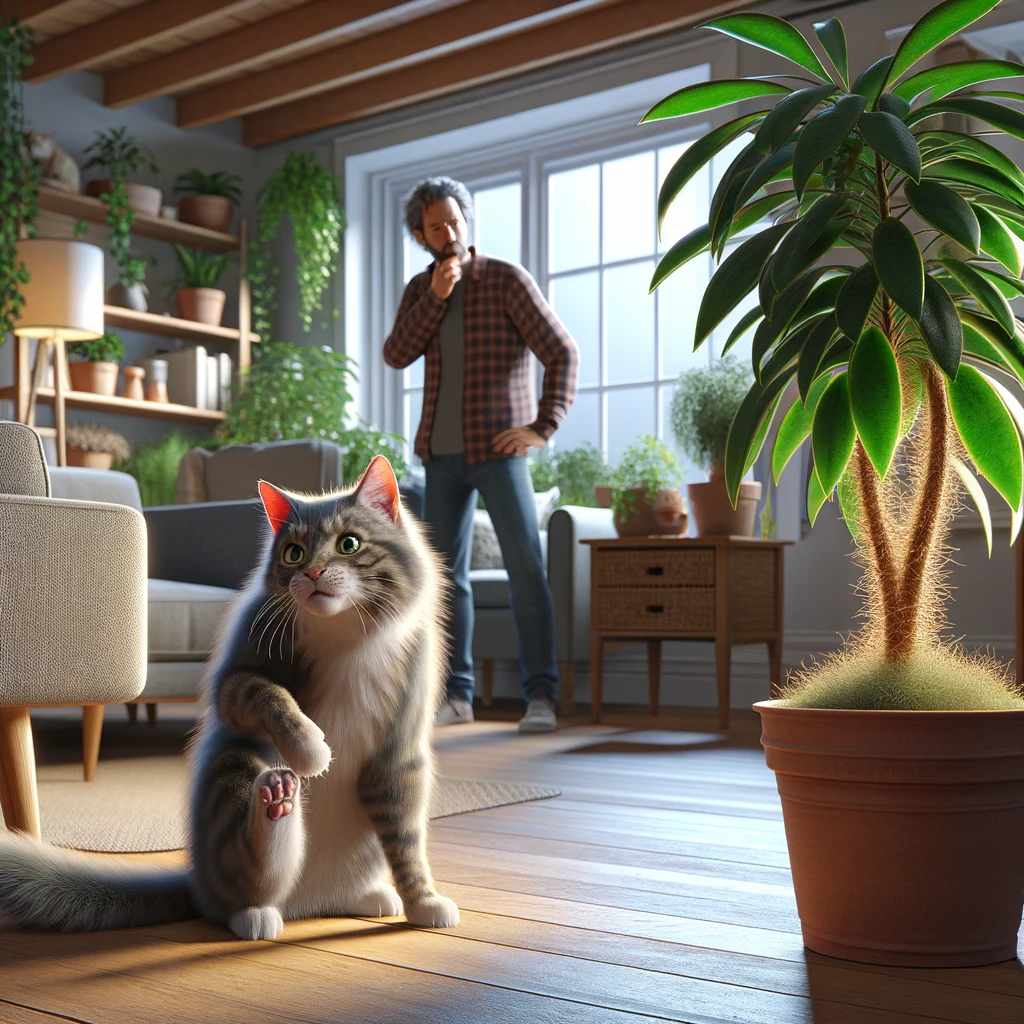
Let’s walk through what to watch for if you suspect your cat come into contact with this plant and take immediate action if necessary.
First things first, skin irritations—does your cat seem itchier than usual? It could be a sign they’ve had a run-in with a wandering jew.
Their skin, particularly around the groin, might look red and bother them more than a pesky flea. Keep an eye out for gastrointestinal upset. (4)
It’s not the most glamorous part of pet ownership, but if your cat is vomiting or has diarrhea, it could be a clue they’ve nibbled on something they shouldn’t have.
Now, if your energetic cat has been less enthusiastic about playtime, this drop in energy could be pointing to lethargy, another potential aftermath of plant mischief. (5)
Here’s a quick rundown of symptoms to keep tabs on:
- Dermatitis: Redness, itching, and possible swelling of the skin.
- Gastrointestinal Distress: Indicators include vomiting and diarrhea. (6)
- Behavioral Changes: Less playfulness, could seem withdrawn or unusually tired.
Remember, you know your furball best. If you notice any strange behaviors or symptoms, it’s a trip to the vet that’s well warranted. Stay vigilant, and let’s keep those kitties cheerful and healthy!
Prevention and Safe Gardening Practices

Strategies for Safe Plant Placement and Handling
Creating cat-proof zones can be a game-changer. Consider these steps:
- Elevate your plants: A simple shelf or hanging basket keeps your wandering jew beyond kitty reach.
- Use cat repellents: Citrus peels or sprays with a citrus scent can discourage cats from exploring certain areas.
Tips to Prevent Cats from Accessing the Plant
Got a curious kitty? Try these tricks:
- Close supervision: When your plants are out for sunlight, keep an eye on them.
- Restrict room access: Sometimes the best method is to block entry to the plant room altogether.
Pet-Friendly Plant Alternatives
Now, for the fun part! Create a cat-safe oasis by picking non-toxic plants. Here are some top picks: (7)
- Spider Plant: Fun to look at and safe for nibbling.
- Boston Fern: Lush and verdant without the worry.
- Cat Grass: Specifically for feline friends to munch on.
I know, you ask, “But where’s the fun without a little risk?” Well, how about safe and sound over sorry? Plus, you won’t be short on style or options with these substitutes. Your cats can have their salad and eat it too!
Remember, you’re crafting a haven for all members of your household. Keep those paws in mind when you’re playing in the dirt, and you’ll all enjoy the greenery without any worries!
First Aid and Emergency Response
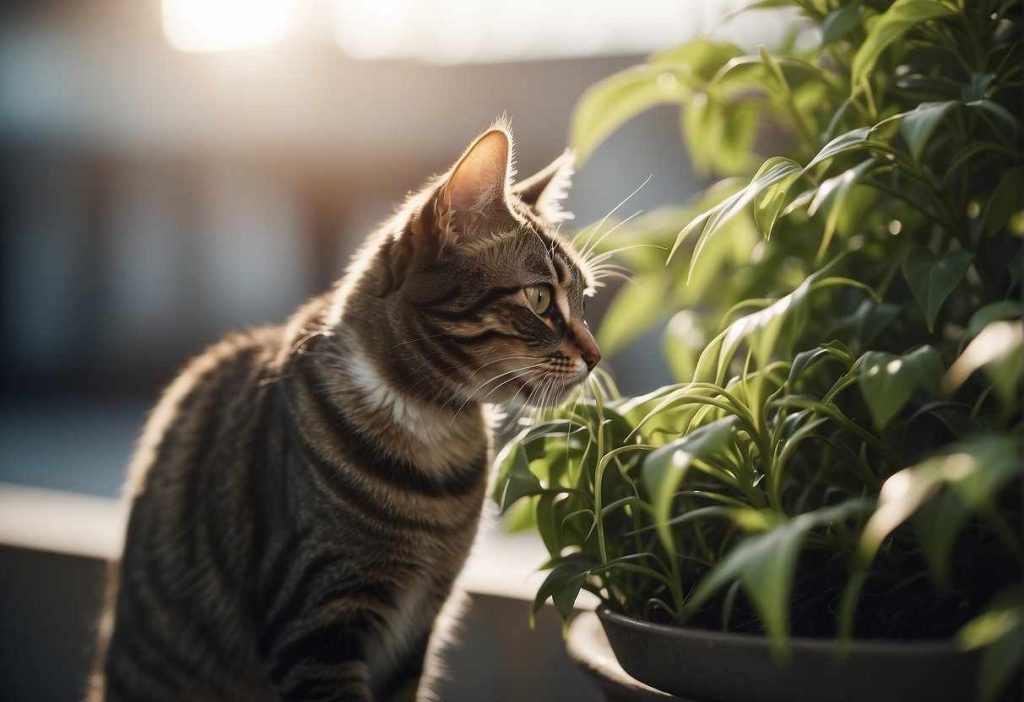
Immediate Steps:
- Remove any plant material: If you catch your cat in the act, gently remove any bits of plant from their mouth or paws.
- Rinse: If they’ve gotten the sap on themselves, a quick bath might be in order to prevent skin irritation.
- Monitor closely: Keep an eye out for any unusual behavior such as excessive scratching, which might indicate a skin reaction.
Symptoms to watch for in case of ingestion:
- Skin irritation
- Upset stomach
- Vomiting
- Diarrhea
When to Seek Veterinary Care:
- If any of the above symptoms appear severe
- If you’re unsure how much your cat has ingested
- If your cat seems lethargic or in distress (8)
Why Seek Help Even for Skin Contact?
The sap of the Wandering Jew can cause dermatitis in cats. This isn’t just an ‘itchy annoyance’; it can lead to more complications if not treated. So, if your kitty’s skin seems irritated, a vet visit is prudent.
Remember: Always err on the side of caution. Your vet would much rather see a healthy cat than a sick one that waited too long.
Stay informed, provide the cat with plenty of water, and keep a list of emergency contact numbers handy.
And, here’s a pro tip – consider getting pet insurance. Trust me, it can be a lifesaver. Emergencies don’t wait for the opportune moment, so better safe than sorry, right? Stay safe and keep those purrs coming!
Engaging with Pet and Plant Communities
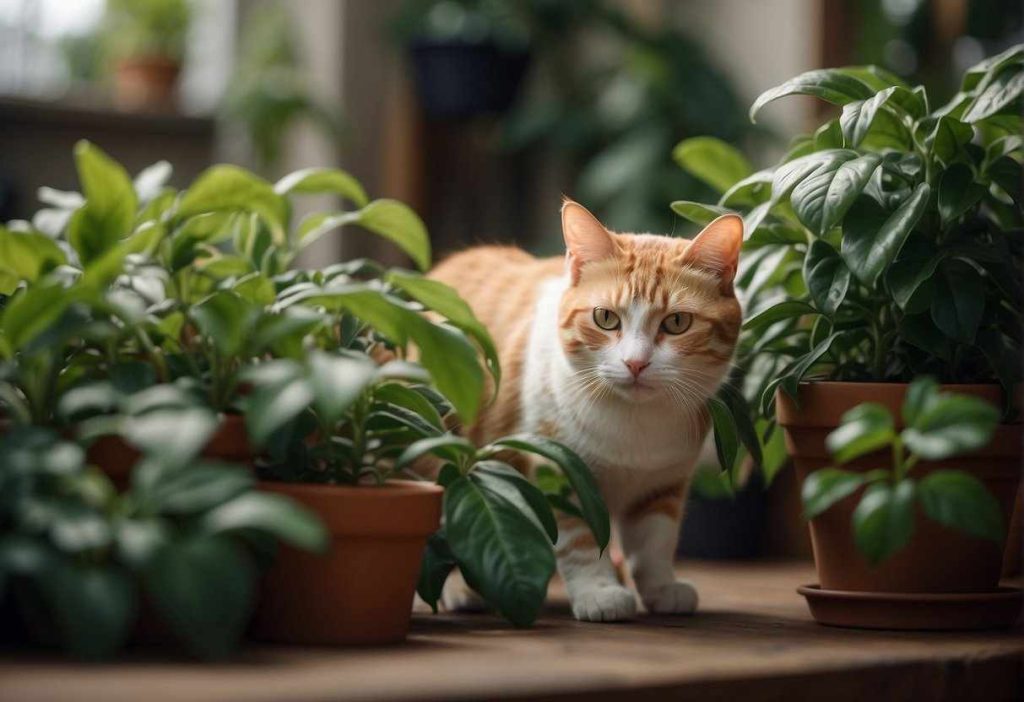
Learning from Other Pet Owners
Nothing beats a real-life story, right? Joining pet forums or local community groups can offer you a wealth of shared experiences.
- Online Forums: Whether you choose Reddit, Quora or specialized cat forums, there are countless threads discussing pet safety around plants including the Wandering Jew.
- Local Meetups: Sometimes the best advice comes from your neighbor! Local plant and pet communities often meet to exchange tips – don’t forget to ask about non-toxic plant alternatives.
Resources for Ongoing Education
Staying informed means keeping your fur baby safe, so here are a couple of resources to bookmark:
- ASPCA’s Toxic and Non-Toxic Plants List: A comprehensive guide to what’s safe and what’s not.
- Pet Poison Helpline: They provide a ton of information and you can call them in case of emergency.
Remember, if you suspect your cat has nibbled on something they shouldn’t have, contacting your vet should be your first step.
On a lighter note, have you ever caught your cat in the act of “taste-testing” your plants? Cats sure are curious creatures!
By staying vigilant and tapping into the knowledge of fellow pet enthusiasts, you can create a thriving home environment that’s safe for both your pets and your plants.
Happy planting, and here’s to curious kitties living their nine lives to the fullest—safely, of course!
Quick Recap
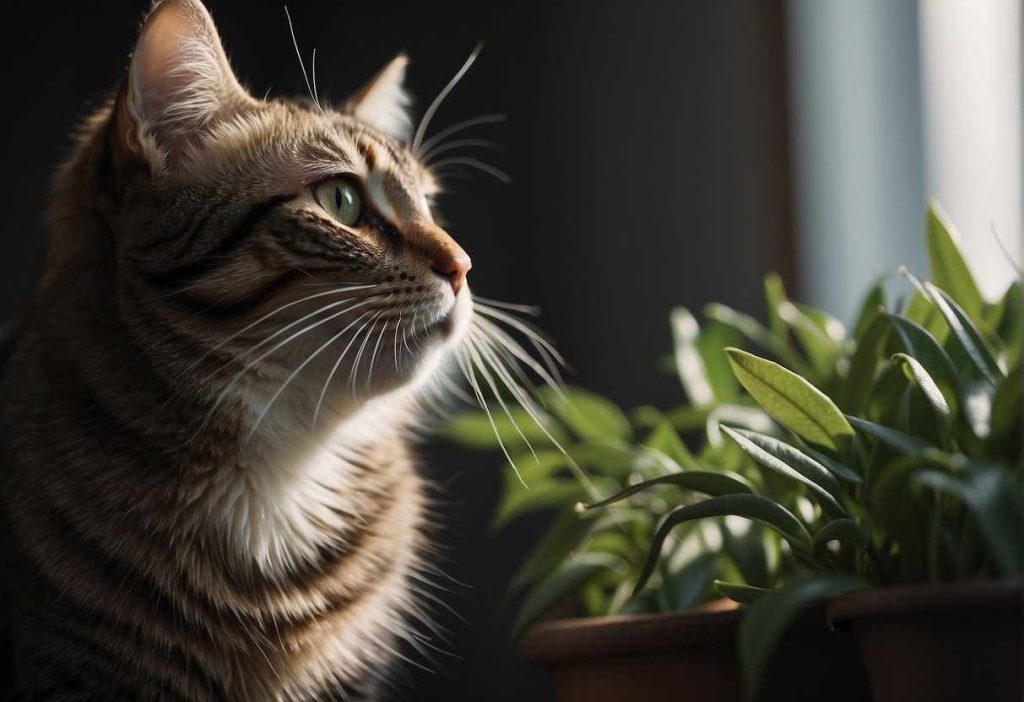
Did you know your fuzzy little friend could get more than just tummy troubles from that plant? Here’s a quick rundown on what you should keep an eye out for:
- Wandering Jew Plant: Quite a name, right? But this trailing vine might spell trouble for your kitty.
- Symptoms in Cats: Cats may experience skin irritation, especially in sensitive areas such as the groin. They are also at risk of oral irritation, drooling, and even vomiting if they chew on the leaves.
| Symptoms | Potential Consequences |
| Skin Irritation | Dermatitis-like condition |
| Oral Irritation | Drooling, discomfort |
| Ingestion | Vomiting, loss of appetite |
Now, don’t panic! Just because your green thumb loves company doesn’t mean you can’t coexist with your purring pals. Keep an eye out and be proactive.
If ever in doubt, a quick call to your vet can put your mind at ease. Remember to keep the wandering jew plant out of reach, and maybe consider some cat-friendly greens.
Got all that? Fantastic! You’re now well-equipped to nurture both your plant babies and fur babies harmoniously. Keep those tails wagging and plants thriving — responsibly!
Frequently Asked Questions
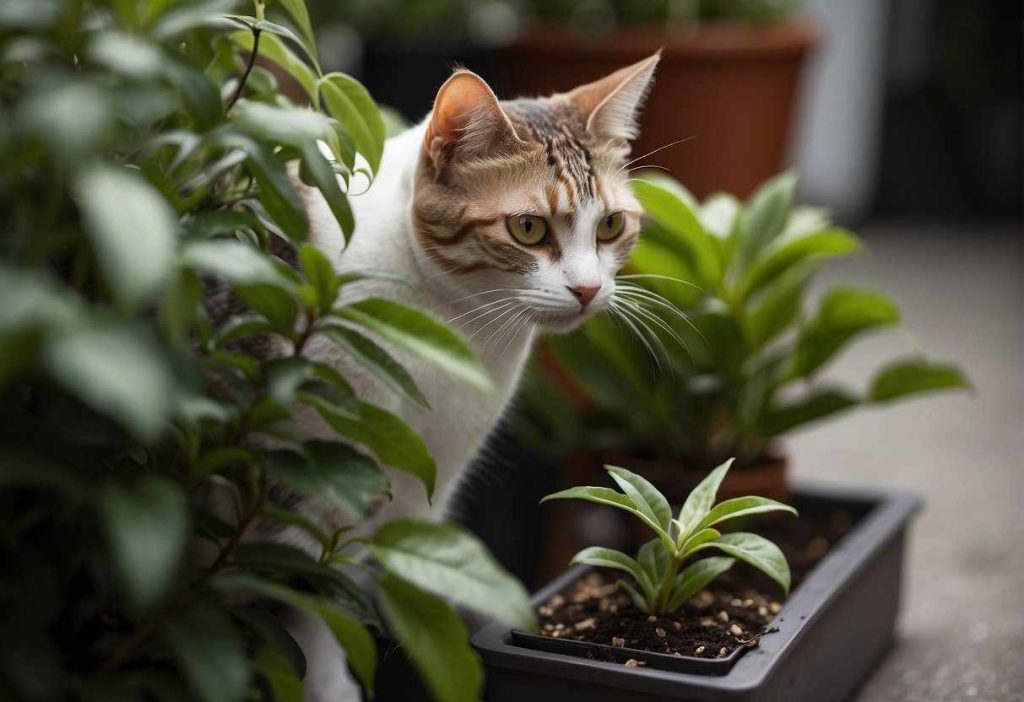
Navigating the world of houseplants and pets can be tricky, especially when it comes to identifying which plants are safe for your furry friends and which aren’t.
You’ve got questions, and we’re here to provide the answers!
Is the Wandering Jew plant toxic to cats?
Yes, the Wandering Jew plant, also known as Tradescantia fluminensis or Speedy Henry, is indeed toxic to cats.
It can cause skin irritation and more serious health issues if ingested.
What are the symptoms of Wandering Jew plant poisoning in cats?
Symptoms of poisoning in cats can include skin irritation, excessive scratching, especially around the groin area, as well as vomiting, diarrhea, drooling, and possible oral irritation if ingested.
What should I do if my cat ingests part of a Wandering Jew plant?
If you suspect that your cat has eaten any part of a Wandering Jew plant, it’s essential to contact your veterinarian immediately.
They can provide the appropriate treatment, which may include inducing vomiting or administering activated charcoal.
Can Wandering Jew plants cause long-term health issues in cats?
Long-term health issues from Wandering Jew plant ingestion are rare but possible, especially if repeated exposure occurs.
Keep a watchful eye on your furry companion and consult with a vet for a thorough health evaluation.
Are there any safe ways to keep a Wandering Jew plant in a home with cats?
To ensure your cat’s safety, it’s best to avoid keeping Wandering Jew plants in your home.
If you must keep them, make sure they are placed in a location that is completely inaccessible to your cat.
What are some cat-friendly plant alternatives to the Wandering Jew?
Looking for safer plant options? Consider cat-friendly plants like catnip, spider plant, or Boston fern.
These are non-toxic and can add greenery to your home without posing a risk to your pets.
What first aid measures can I take for a cat that has ingested a toxic plant?
For immediate first aid, if your cat has ingested a toxic plant, remove any plant material from your cat’s mouth and gently rinse with water.
Don’t induce vomiting unless instructed by a professional, and get your cat to the vet as soon as possible.

